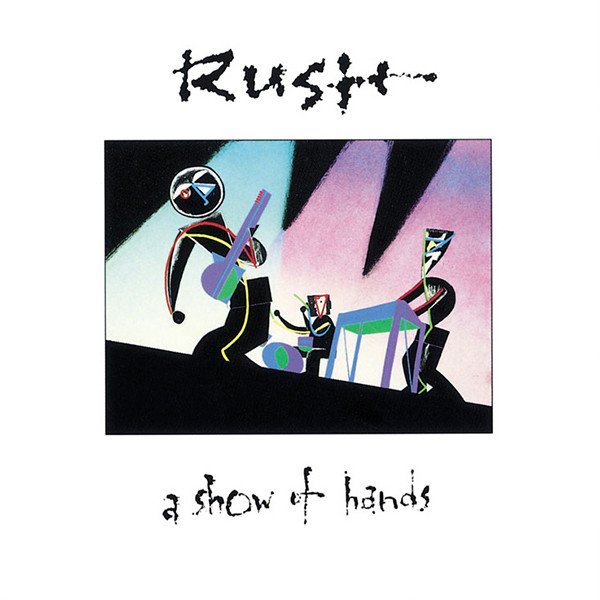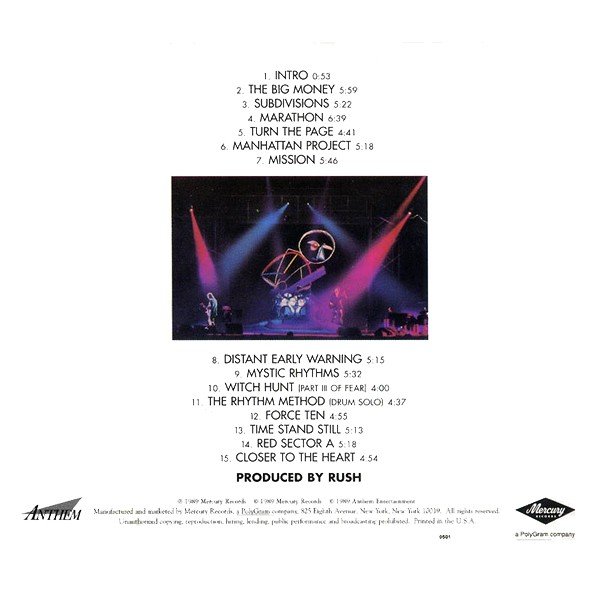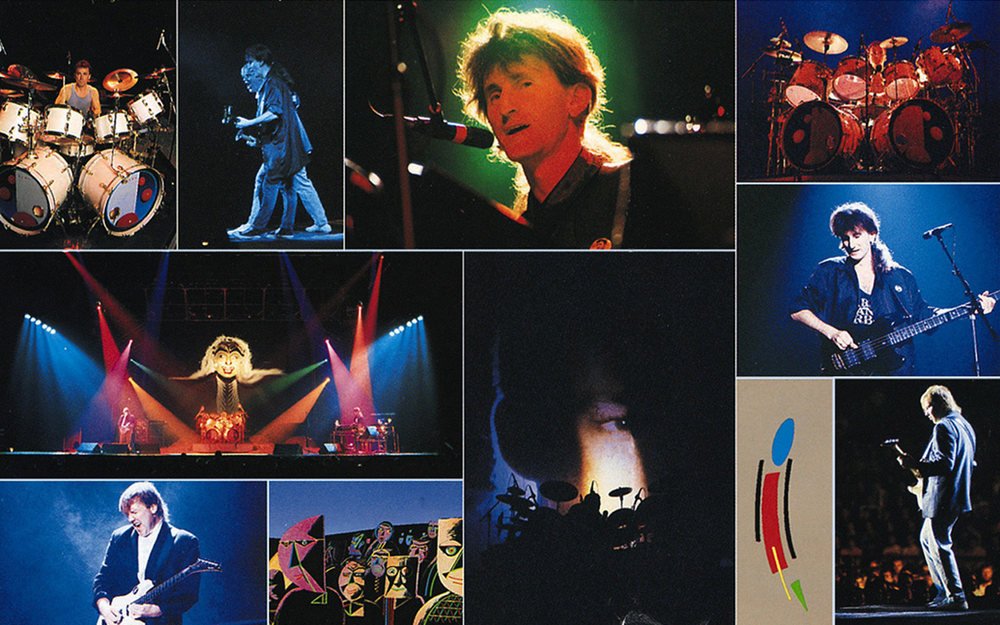RUSH - A SHOW OF HANDS: Lifeson's Live Revenge
During their time at Mercury Records, Rush tended to use live albums as a way to put a bow on the end of a career phase. This is definitely true for A Show Of Hands, a kind of live retrospective of the band's high-tech phase. Reproducing this material on stage was a military operation that required a vast array of digital equipment plus all three members of the band triggering samples with split-second timing throughout the show (such complexity hastened the end of this phase). It tends to be the least favorite live album from this era for fans, partly due to old-guard fans disliking the pop-minded material from Power Windows and Hold Your Fire that makes up half the album and partly because by necessity it has an overtly slick sound reflecting its high-tech performances. However, a close listen will reveal that the live setting brought out new dimensions to this material, particularly when it comes to Alex Lifeson's guitar work. The first disc kicks off with "The Big Money" and its differences from the studio version quickly become apparent: Lifeson's guitar is much more prominent in the mix and there's more separation between instruments, giving the arrangement an airier feel despite the use of samples and synths. "Subdivisions" is anchored by its keyboards but the guitar and drums have plenty of bite, especially a searing Lifeson solo. "Marathon" brings the guitar/bass interplay into clear focus, allowing the listener to appreciate how they trade off each other, and Geddy Lee's switch to keyboards at chorus time provides an ethereal contrast. "Turn The Page" highlights the dexterous work of Lifeson as he throws shapes around Lee's taut bassline with growling rhythm guitar work. Similarly, the guitar-driven bridges in "Manhattan Project" ring out with new power and Lee wraps sinuous bass work around them even as he holds down a thick battery of keyboard lines. "Mission" is an emotive vocal showcase for Lee, showing off the elegance of his middle range, and the band displays its range as they shift between pastoral passages thick with keyboards and taut interplay during verses. Their communication as a trio is also deftly displayed on its proggy instrumental break.
The first disc kicks off with "The Big Money" and its differences from the studio version quickly become apparent: Lifeson's guitar is much more prominent in the mix and there's more separation between instruments, giving the arrangement an airier feel despite the use of samples and synths. "Subdivisions" is anchored by its keyboards but the guitar and drums have plenty of bite, especially a searing Lifeson solo. "Marathon" brings the guitar/bass interplay into clear focus, allowing the listener to appreciate how they trade off each other, and Geddy Lee's switch to keyboards at chorus time provides an ethereal contrast. "Turn The Page" highlights the dexterous work of Lifeson as he throws shapes around Lee's taut bassline with growling rhythm guitar work. Similarly, the guitar-driven bridges in "Manhattan Project" ring out with new power and Lee wraps sinuous bass work around them even as he holds down a thick battery of keyboard lines. "Mission" is an emotive vocal showcase for Lee, showing off the elegance of his middle range, and the band displays its range as they shift between pastoral passages thick with keyboards and taut interplay during verses. Their communication as a trio is also deftly displayed on its proggy instrumental break. Second disc opener "Grace Under Pressure" plays like a slightly feistier version of its studio counterpart, heavy on the drum fills from Peart. "Mystic Rhythms" is one of the best tracks on this set, one where the spartan arrangement translates beautifully to the live arena: Lifeson's complex rhythm guitar work comes to the fore while tribal beats from Peart hold things down and Lee supplies emotive vocals and atmospheric synth layers. "Witch Hunt" aggressively deploys samples to maintain the studio version's layered arrangement but benefits from the newly amplified snarl of Lifeson's riffs. "The Rhythm Section" is Peart's drum solo from "YYZ" separated as its own track and works fine as a standalone showpiece, complete with synth-horn blasts pacing its finale. The final side starts with a one-two of Hold Your Fire tracks in "Force Ten" and "Time Stand Still": rowdy guitar/bass interplay gives the former a new edge while Lee gives a more intense, emotional vocal performance on the latter in contrast to the mellow original recording. "Red Sector A" retains its slickness but the live arena brings out extra emotion in guitar and vocals. "Closer To The Heart" elegantly rounds out the set with a unique, Police-esque 'reggae rock' closing section.
Second disc opener "Grace Under Pressure" plays like a slightly feistier version of its studio counterpart, heavy on the drum fills from Peart. "Mystic Rhythms" is one of the best tracks on this set, one where the spartan arrangement translates beautifully to the live arena: Lifeson's complex rhythm guitar work comes to the fore while tribal beats from Peart hold things down and Lee supplies emotive vocals and atmospheric synth layers. "Witch Hunt" aggressively deploys samples to maintain the studio version's layered arrangement but benefits from the newly amplified snarl of Lifeson's riffs. "The Rhythm Section" is Peart's drum solo from "YYZ" separated as its own track and works fine as a standalone showpiece, complete with synth-horn blasts pacing its finale. The final side starts with a one-two of Hold Your Fire tracks in "Force Ten" and "Time Stand Still": rowdy guitar/bass interplay gives the former a new edge while Lee gives a more intense, emotional vocal performance on the latter in contrast to the mellow original recording. "Red Sector A" retains its slickness but the live arena brings out extra emotion in guitar and vocals. "Closer To The Heart" elegantly rounds out the set with a unique, Police-esque 'reggae rock' closing section. In short, there are a lot of rewards for the Rush fan on this overlooked live double. Even with tech overload required for the performance of these songs, there's a slight stripping down of the material that allows you to focus on how much of the band's old prog virtuosity was applied to this material in subtler, more directed ways. Lifeson's guitar is the biggest beneficiary: his work during this era is often discussed in terms of texture and its new prominence in the mix allows you to appreciate the complexity and fire layered into those well-crafted solos and riffs. In fact, you could consider this his revenge on having so much of his work submerged in the busy mixes of the studio versions for these songs. In summation, if you appreciate Rush's high-tech era, this is more than a live souvenir - and if you're left cold by the sound of this era's studio recordings, this might give you a chance to reevaluate how good the songs (and Lifeson's guitar parts) are.
In short, there are a lot of rewards for the Rush fan on this overlooked live double. Even with tech overload required for the performance of these songs, there's a slight stripping down of the material that allows you to focus on how much of the band's old prog virtuosity was applied to this material in subtler, more directed ways. Lifeson's guitar is the biggest beneficiary: his work during this era is often discussed in terms of texture and its new prominence in the mix allows you to appreciate the complexity and fire layered into those well-crafted solos and riffs. In fact, you could consider this his revenge on having so much of his work submerged in the busy mixes of the studio versions for these songs. In summation, if you appreciate Rush's high-tech era, this is more than a live souvenir - and if you're left cold by the sound of this era's studio recordings, this might give you a chance to reevaluate how good the songs (and Lifeson's guitar parts) are.


